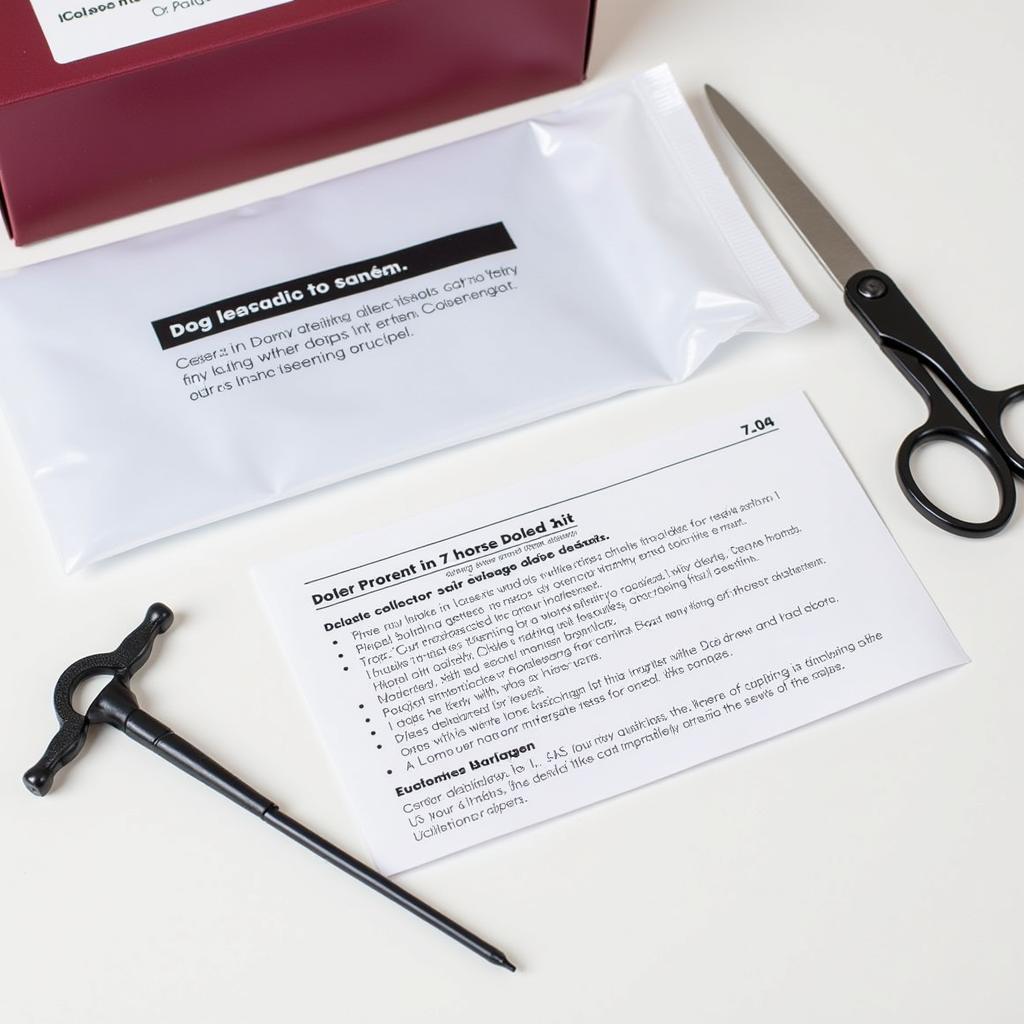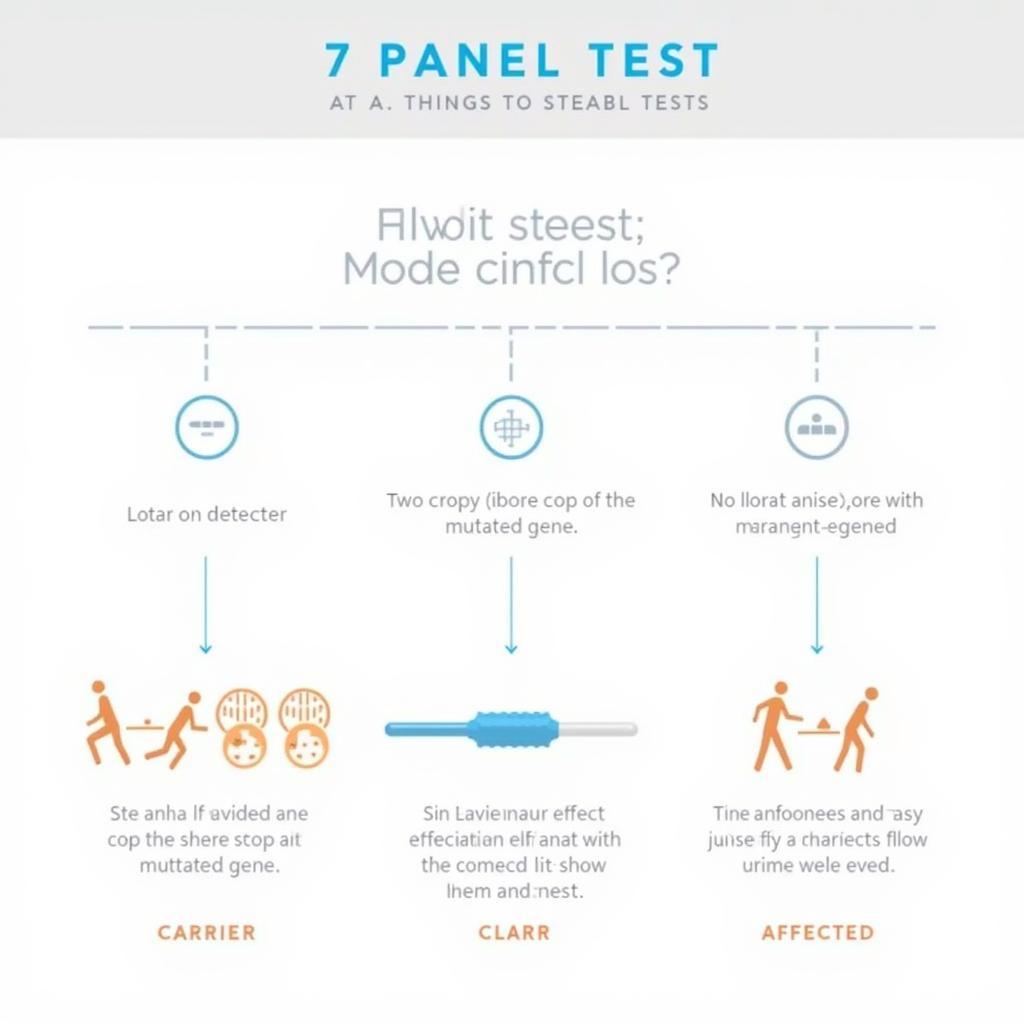The 7 panel test for Quarter Horses is a vital tool for breeders and owners alike, offering valuable insights into a horse’s genetic makeup. This test screens for seven specific genetic disorders prevalent in the Quarter Horse breed, allowing for informed breeding decisions and proactive healthcare management. Understanding the significance of this test can contribute to the well-being of your horses and the future of the breed.
What is the 7 Panel Test?
The 7 panel test, sometimes referred to as the “basic” or “core” panel, is a DNA test that checks for seven different genetic disorders commonly found in Quarter Horses. These disorders, while often recessive, can have significant impacts on a horse’s health and performance.
Why is the 7 Panel Test Important for Quarter Horses?
The 7 panel test is crucial for Quarter Horses due to the prevalence of these genetic disorders within the breed. By identifying carriers, breeders can make informed decisions to avoid mating two carriers, thereby reducing the risk of producing affected foals. This proactive approach is essential for promoting responsible breeding practices and minimizing the occurrence of these debilitating conditions.
What Specific Genetic Disorders Does the 7 Panel Test Screen For?
The 7 panel test screens for the following genetic disorders:
- Hyperkalemic Periodic Paralysis (HYPP): This muscle disease causes episodes of muscle tremors, weakness, and potentially fatal paralysis.
- Polysaccharide Storage Myopathy Type 1 (PSSM1): Horses with PSSM1 experience muscle stiffness, pain, and exercise intolerance due to abnormal glycogen storage.
- Malignant Hyperthermia (MH): Triggered by certain anesthetics, MH leads to a rapid and dangerous increase in body temperature and muscle rigidity.
- Hereditary Equine Regional Dermal Asthenia (HERDA): This connective tissue disorder causes fragile skin that tears and scars easily.
- Glycogen Branching Enzyme Deficiency (GBED): A fatal condition affecting foals, GBED disrupts glycogen storage and leads to severe organ dysfunction.
- Myosin-Heavy Chain Myopathy (MHCM): This muscle disease results in muscle atrophy, weakness, and exercise intolerance.
- Spinal Muscular Atrophy (SMA): Affecting young foals, SMA causes progressive muscle wasting and weakness, often leading to an inability to stand.
How is the 7 Panel Test Performed?
The 7 panel test requires a simple blood or hair sample from your horse. This sample is then sent to a specialized laboratory where DNA is extracted and analyzed for the presence of the specific gene mutations associated with the seven disorders.
 7 Panel Test Kit
7 Panel Test Kit
Understanding the Results
The results of a 7 panel test will indicate whether a horse is:
- Clear: The horse does not possess any copies of the mutated genes for the seven disorders.
- Carrier: The horse carries one copy of the mutated gene for a specific disorder but does not show symptoms. Carriers can still pass the mutation on to their offspring.
- Affected: The horse has two copies of the mutated gene for a specific disorder and is likely to display symptoms.
 Understanding 7 Panel Test Results
Understanding 7 Panel Test Results
What to Do with the 7 Panel Test Results
Understanding your horse’s 7 panel test results is crucial for making informed decisions about breeding and healthcare.
- Breeding: If you are considering breeding your horse, knowing their carrier status for these disorders is vital. Avoiding breeding two carriers can significantly reduce the chances of producing an affected foal.
- Healthcare: Early detection of carrier status allows for proactive healthcare management. While carriers may not exhibit symptoms, knowing their genetic predisposition can inform preventative care and management strategies to mitigate potential risks.
Beyond the 7 Panel Test: Expanding Genetic Testing Options
While the 7 panel test offers essential insights into a horse’s genetic health, it’s important to remember that it is not exhaustive. As research progresses, additional genetic tests for other disorders are becoming available.
Frequently Asked Questions
How much does the 7 panel test cost?
The cost of the 7 panel test can vary depending on the laboratory and any additional services offered. It’s best to contact equine genetic testing laboratories directly for current pricing.
Where can I get my horse tested?
Numerous reputable equine genetic testing laboratories specialize in the 7 panel test and other genetic screenings. You can find a list of accredited laboratories online or through your veterinarian.
How accurate is the 7 panel test?
The 7 panel test is highly accurate when performed by a reputable laboratory using reliable testing methods.
If my horse is a carrier, will they develop the disorder?
Carriers of a single copy of a recessive gene mutation typically do not exhibit symptoms of the disorder. However, they can still pass the mutation on to their offspring.
Need More Information?
For personalized guidance and support regarding your horse’s health and the 7 panel test, our team at Justus Horses USA is here to assist you.
Contact us today:
Phone Number: 0772127271
Email: [email protected]
Address: QGM2+WX2, Vị Trung, Vị Thuỷ, Hậu Giang, Việt Nam.
We have a dedicated customer support team available 24/7 to answer your questions and provide expert advice. Learn more about equine health and explore a wide range of horse care products on our website. You can find more information about soft horse brushes and other essential supplies on our website. Your horse’s well-being is our priority!